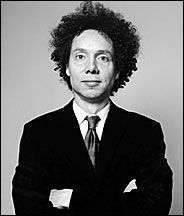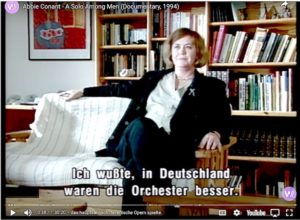By Jan Herman
If Malcolm Gladwell had written about you in his latest best seller, Blink: The Power of Thinking Without Thinking, you’d probably know it in a New York minute. If you were Abbie Conant, who is the subject of the book’s final chapter, you wouldn’t.
 When pressed, Conant recalls speaking with Gladwell (right) by phone. But she lives in Germany and had only a vague idea of who he was. She didn’t subscribe to The New Yorker, where he’s a staff writer, and hadn’t read The Tipping Point: How Little Things Can Make a Big Difference, his previous best seller.
When pressed, Conant recalls speaking with Gladwell (right) by phone. But she lives in Germany and had only a vague idea of who he was. She didn’t subscribe to The New Yorker, where he’s a staff writer, and hadn’t read The Tipping Point: How Little Things Can Make a Big Difference, his previous best seller.
It took an old friend she knew from Colorado, now a research librarian at Fortune magazine in New York, to break the news to her long after Blink had soared to No. 1 on The New York Times Hardcover Nonfiction list. (It’s been on the list for 11 weeks, No. 1 for most of them.)
“I hadn’t read anything more than a few blurbs about the book,” says Susan Kaufman, recalling Gladwell’s appearance a while ago at a meeting of the Special Libraries Association. “He was a big draw. The place was packed. It was not the usual.” Gladwell told the librarians he wasn’t going to read from his book. “He said, “I think it’s better if I tell you a story,'” Kaufman recalls. “And then he proceeded to say there was this musician in Germany, and he said her name. It was such an odd thing. Abbie hadn’t ever mentioned that he had spoken to her for the book. He went on and on.”
Kaufman (a violist) and Conant (a trombonist) met in the late ’70s when they’d played together in the Colorado Philharmonic, a training orchestra. Though they went their separate ways afterward — Kaufman, who had graduated from Barnard, entered Columbia’s library school and took up a research career; Conant graduated from the University of New Mexico and Juilliard into an orchestra career in Turin and Munich and is now a trombone professor — they’d always kept in touch.
 After Gladwell’s lecture, Kaufman says, “I ran up to the front and told him it just so happens I’m a good friend of Abbie’s. He kind of looked up. ‘Say hello to her,’ he said. … And he signed a book for her, ‘To my inspiration.’ The funny thing, if I had mentioned this to any of my colleagues there, nobody would have believed it.”
After Gladwell’s lecture, Kaufman says, “I ran up to the front and told him it just so happens I’m a good friend of Abbie’s. He kind of looked up. ‘Say hello to her,’ he said. … And he signed a book for her, ‘To my inspiration.’ The funny thing, if I had mentioned this to any of my colleagues there, nobody would have believed it.”
Here’s the first chapter of Blink. As for the final chapter, Gladwell credits Conant’s husband, composer and musicologist William Osborne, with the most complete version of her amazing story. He recounts and analyzes the discrimination she faced after she won a blind audition, besting 32 male candidates, for principle trombonist in the Munich Philharmonic.
“When she stepped from behind the audition screen, the orchestra was shocked,” Osborne explains. “It is a case study perfectly suited to the thesis of Gladwell’s book.” Now have a listen to Conant performing “Leonore,” a music theater piece he and Conant wrote in reaction to her experiences in the Munich Philharmonic.




